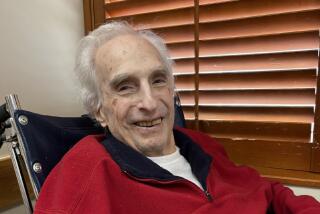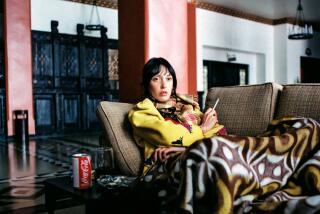How Selznick Heirs Documented a Legend
- Share via
David O. Selznick, the legendary producer of “Gone With the Wind,” was, in the words of his sons Jeffrey and Daniel Selznick, a cheerful, charming, arrogant madman who was passionate about making movies and throwing a good party.
To Hollywood film makers, Selznick was a compulsive gambler who loved to play high stakes when it came to making movies. His employees called him a terribly disorganized “man of memos,” and the public called him crazy to spend $3 million on one film.
These disparate views are recounted in a documentary that Jeffrey and Daniel Selznick have produced, “The Making of a Legend: ‘Gone With the Wind,’ ” which is being shown as part of the premiere week of programming on cable’s new Turner Network Television (TNT) channel. It screens next on Sunday at 9 a.m.
Drawing on production sketches, screen tests and newsreel footage from the personal files of the Selznick family and the Turner Entertainment Co., interviews with former Selznick employees and cast members, and Selznick’s endless production memos, the Selznick brothers tell how their father created one of America’s most beloved and highest grossing motion pictures out of chaos, blind faith and luck.
“I think he had enormous doubts about what he was doing, and the whole town thought he was crazy,” Jeffrey Selznick said in an interview in front of the Culver City Studios building that used to bear the name of his father’s company, Selznick International, and which was used as Tara in the 1939 classic.
Daniel Selznick said that “Gone With the Wind” fans had been suggesting a documentary about the making of the film for years.
“People have asked us, ‘Why don’t you do it? You’re going to lose the few survivors. They’re going to be dying right and left on you,’ ” he recalled. “We always wanted to do it; there just wasn’t a way to fund it on our own.”
He had tried unsuccessfully to interest CBS when that network had the broadcast rights to “Gone With the Wind.”
“When Ted Turner acquired the old MGM library (in 1986), I called Jeff up and said, ‘Maybe we have a possible new buyer for our documentary project.’ We have been trying to sell this project for 12 years.”
Turner gave them the go-ahead.
The Selznicks started research in March, 1987, beginning at the Selznick Archives at the University of Texas at Austin, where most of the production records, correspondence, stills and sketches were. More research was gathered at the archive collection of screenwriter Sidney Howard at UC Berkeley and at the University of Chicago, where the work of Ben Hecht, who worked with Selznick on the script for two critical weeks, was on display.
The Selznicks’ next step was to find people who had worked on the film.
“When we started out, we didn’t know who was alive or who wasn’t alive,” Daniel Selznick said.
They wound up interviewing actresses Butterfly McQueen, Evelyn Keyes and Ann Rutherford, production manager Ray Klune, associate film editor James E. Newcom, Kay Brown (who sold Selznick the rights to Margaret Mitchell’s best seller), two of Selznick’s personal secretaries, camera operators, an extra, one of the assistant directors and someone who had witnessed the film’s secret sneak preview.
“We did research in England on Vivian Leigh to try to explore or verify the story on how she came to get the role,” Jeffrey Selznick said.
“We talked to her original agent, who’s still alive; he’s 95. We found her family films, which her daughter has, showing her as a young girl and (which) includes footage of her here in Los Angeles during ‘Gone With the Wind.’ . . . Things like that kept coming.
“And I must tell you that even when it was too late for things to go in the show, they were still drifting in. One little nugget here, a little nugget there. Stills coming from a hundred different sources, some that have never been seen. In the end we chose . . . I think from over 3,000 (stills).”
The Selznicks also tracked down an audio tape of a Clark Gable interview at the Hollywood Collection at USC.
Their biggest disappointment, however, was not finding any recorded interviews with Vivien Leigh, except for the newsreels from the film’s Atlanta premiere and from the Academy Award ceremonies at which she was named best actress.
But once the documentary was completed, the Selznick sons, who were 6 and 3 when their father made “Gone With the Wind,” were satisfied.
“It think he’d be pleased,” Daniel Selznick said. “He loved celebrations.”
More to Read
The biggest entertainment stories
Get our big stories about Hollywood, film, television, music, arts, culture and more right in your inbox as soon as they publish.
You may occasionally receive promotional content from the Los Angeles Times.









